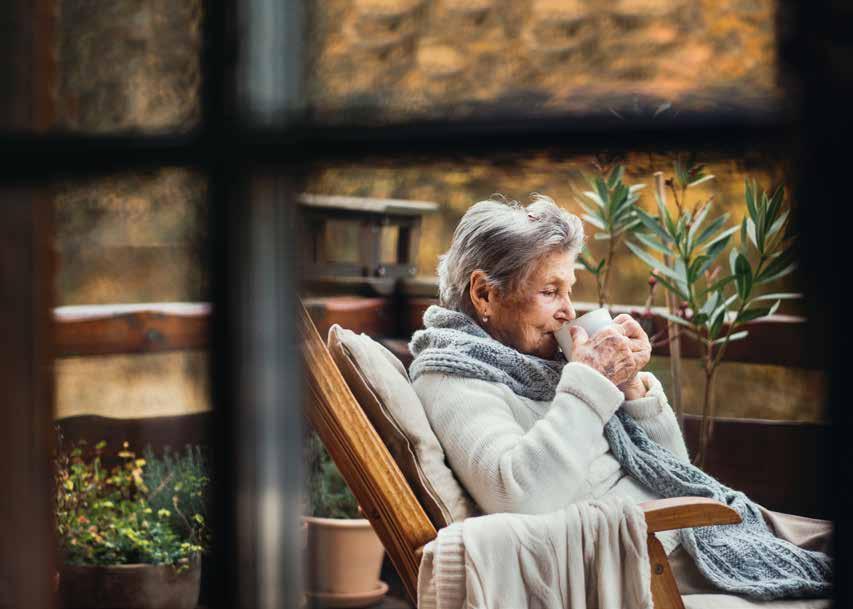
3 minute read
Eight benefits of
Aging at home with in-home care
Independence is a little secret of longevity. Being able to remain in your own home as you age has a multitude of benefits. Plus, it truly eclipses assisted living facilities, rehabilitation centers, and nursing homes. Sometimes, all you need to remain independent is a caregiver to help with the more difficult daily living areas as often as you need them. The eight top benefits include:
Advertisement
Cost-effectiveness. A study published by the American Journal of Medicine showed that patients who received home care after hospital discharge saved roughly $6,500 over a year and decreased readmission and death risk. For others who require daily assistance, the flexibility of in-home care allows individuals the opportunity to receive part-time, full-time, or respite care. Individualized attention and care. Traditional institutions for caregiving do not compare to the one-on-one attention that in-home care offers. While caregivers are attending to several individuals at once in a facility, in-home caregivers are responsible for one individual. Time, energy, and attention are focused on one person, which provides companionship and improves social interaction— both of which play an essential role in the overall quality of life.
Maintain independence. People value their independence, especially those of us who are creeping up in age. Many individuals who require assistance in daily living feel the stress and anxiety of being unable to care for themselves independently. In-home care helps maintain a sense of control over their lives and offers more freedom while still having the support of a caregiver to
assist with many tasks and chores that cannot be done otherwise. Those who require less assistance typically opt for in-home care as opposed to reducing their level of independence.
Familiarity. People with Alzheimer’s and dementia function better with familiarity and routine. Being able to stay in the same neighborhood, waking up in the same home, and following the same routines can be valuable to individuals with cognitive disorders.
Maintain connections. Independence is not the only thing that individuals maintain when they receive in-home care. They have the opportunity to maintain relationships and connections with those around them. They can stay involved in spiritual and religious communities, keep connections with local service providers and healthcare professionals, and enjoy their favorite familiar places.
Keep pets. Assisted living facilities, rehab centers, and nursing homes do not allow individuals the opportunity to keep beloved family pets or get new pets. Owning pets can reduce anxiety, stress, and depression. Pets also contribute to lower blood pressure and cholesterol and even help improve physical activity. While many caregiving options take away the opportunity to own pets, in-home care can help care for the pet.
Comfort. Of all of the benefits that in-home care provides, comfort is probably the biggest. Peoples’ homes are a safe place for them, holding security and precious memories. Having that safety and comfort alone can help reduce anxiety and depression.
Reduce caregiver burnout. Family members who are responsible for the care of a loved one often suffer from caregiver burnout. Not only are they responsible for their own families and jobs, but they carry the weight of making sure that their loved one is safe and that their needs are met. In-home care helps take that extraordinary pressure off family members and provides reassurance that their loved ones receive care and remain safe. It makes sense for seniors to remain living in their own homes. These top eight reasons are excellent considerations for every senior to ponder.
Living in your own home is wonderful. It is you. But there are times when you struggle with specific daily tasks or even going to the doctor. Driving may be too much for you now. Your laundry may be a dreaded chore, and changing your linens is just too difficult. Don’t let these difficulties get in the way of your independence and happiness. You can supplement your daily living with an in-home caregiver who can tackle the hard stuff and allow you to joyfully live in your own home, independently.
Think of it like this: if your house needs painting, you will hire a painter, right? Well, when you need some help at home, you hire a caregiver. While it may be hard for you to ask for help, once you do, you will be happy and relieved that you did.
Enjoy the home you love and the independence that accompanies it!







